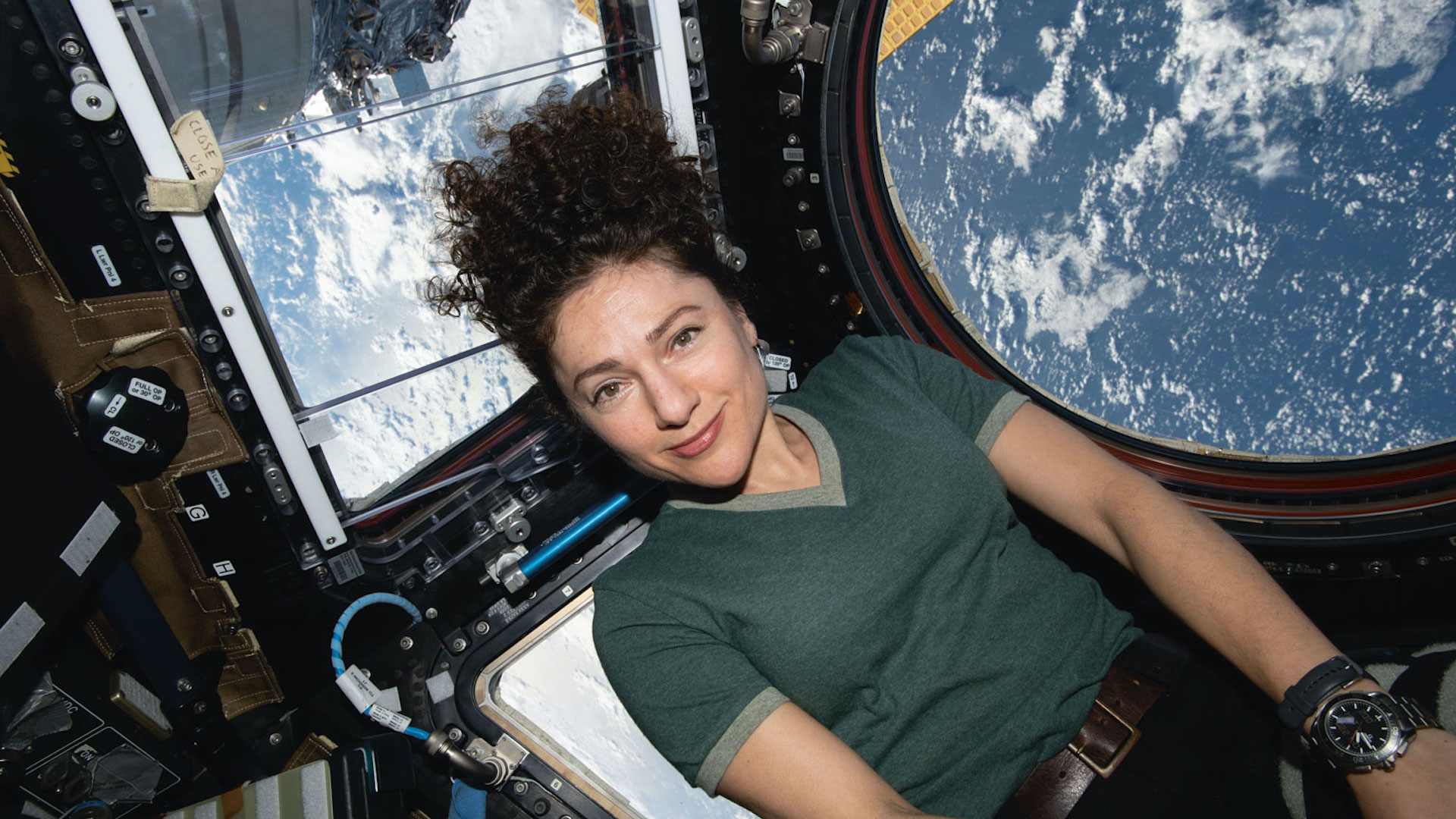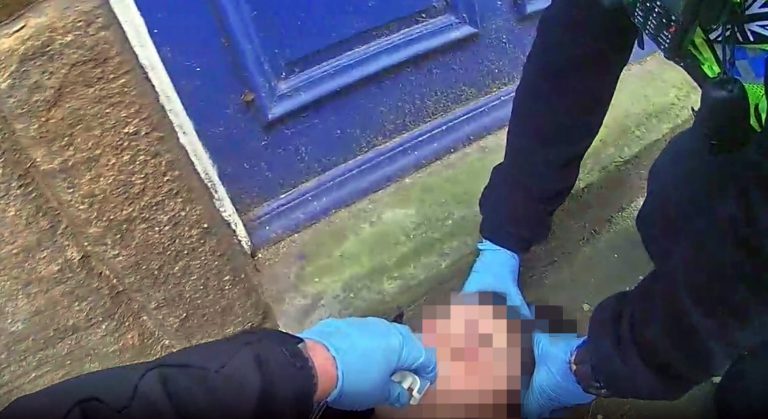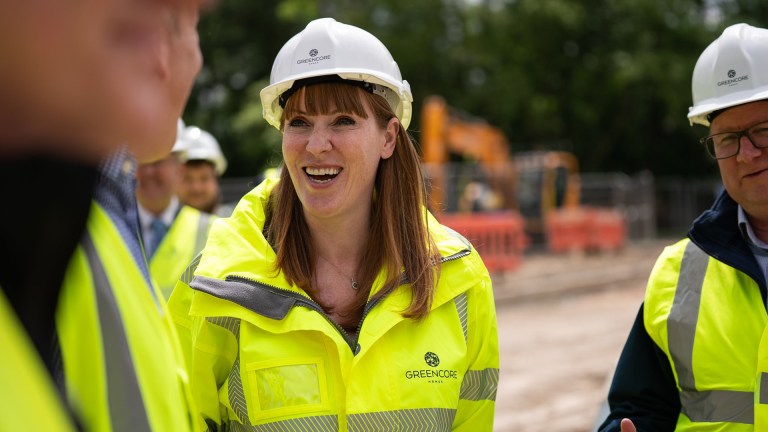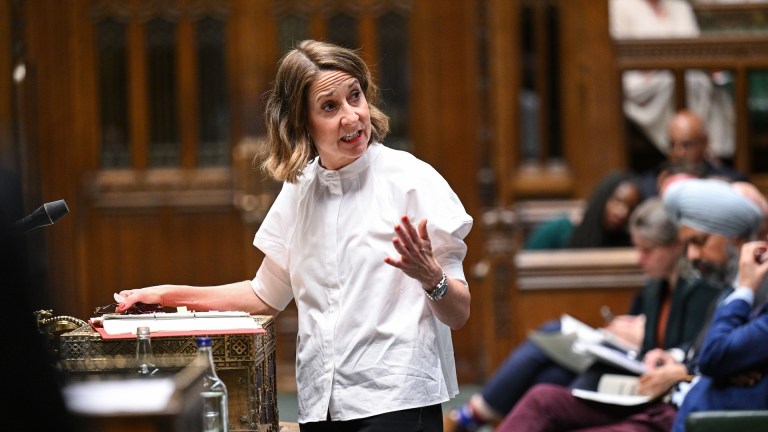When coronavirus started spreading uncontrollably, relentlessly, leaving no place on Earth free from its effects, Jessica Meir was one of only three humans completely guaranteed not to catch it.
That’s because Meir had launched to the International Space Station on September 25 2019, where she spent the next 205 days orbiting our planet. In the ultimate protective support bubble 250 miles above us, Meir looked down on a world that was transforming.
Support The Big Issue and our vendors by signing up for a subscription
“It was a surreal thing for us to process,” she says. “We knew that everybody on Earth – all 7.5 billion people – were affected and susceptible to this disease. We were the only three people that weren’t.
“It felt like the start of a really bad science-fiction movie. You know, suddenly the entire planet is wiped out by a meteor impact or something, and it cuts to the space station – the human species is gone and we’re the only three remaining.
“We wouldn’t even have known anything was happening because out the window, the Earth looked equally as stunning and beautiful as it did the day before.”
There are usually six people onboard the space station, two teams of three that are replaced in shifts. While half the astronauts returned to Earth in February, their replacements were postponed, so Meir and her colleagues Drew Morgan and Oleg Skripochka spent two and a half months wondering what was going to happen next.
Mission control – which formed a second base so each team could work in isolation from the other – kept the astronauts up to date with the developing pandemic. But they didn’t have to.
It’s a dreary day in #Houston…currently daydreaming back to my vibrant views from @Space_Station. This gorgeous section of the coastline of #Egypt (NW corner of the Red Sea) was captured Feb. 2020. #EarthArt pic.twitter.com/fvWCO7DWl3
— Jessica Meir (@Astro_Jessica) December 15, 2020
“Sometimes they are careful about how they relate information,” Meir explains.
“If something really bad happens to a loved one, a death for example, you establish with your team on the ground before you go whether they should inform you. You say, I do or I don’t want to know, given the fact that we are so far away, can’t do anything and the psychological impact it could have.
“But they certainly don’t hide things from us. We do have the capability to tune in to some TV channels but it’s a little different than receiving news on the ground. You’re not constantly inundated with updates on your phone.”
The 43-year-old has a Swedish mother and Israeli father, who moved to Caribou, Maine, where Meir was born. She knew aged five she wanted to be an astronaut but before joining Nasa got a PhD in marine biology, which involved diving with penguins in the Antarctic, then became an assistant professor of anaesthesia at Harvard. Since 2000 she had worked on and off with Nasa and was finally selected for the astronaut programme in 2013.
While we all had to adapt to working remotely, Meir has spent years preparing to work extremely remotely, and life on board the space station stayed closer to normal for them than it did for anyone else.
The crew carried out experiments involving the immune system and cardiovascular system in space, with the research aiming to discover more about the long-term effects of space travel but also improve the lives of the rest of us on the ground.
Meir says: “We’ve seen evidence that artery walls get thicker and stiffer in space, equivalent to about 20 to 30 years of ageing in some cases.”
This has obvious implications for the future of space flight. At least we know the kind of attacks we’d be facing on Mars, heart attacks. But as space travel effectively accelerates the ageing process, there is endless potential to better understand the process and develop treatments.
During her mission, Meir also shattered an incredibly high-altitude glass ceiling
when she joined her colleague Christina Koch to boldly go where no women had gone before, on the first all-female spacewalk. The mission to replace a faulty battery unit lasted seven hours 17 minutes (interrupted only when the pair had to make polite chitchat with President Trump).
In April, after 3,280 orbits of the Earth – a trip of 86.9 million miles, travelling at a speed of 17,500 miles an hour – Meir’s mission was accomplished. The previous week a new crew had arrived, who explained that the world they had left the previous year had changed.
“We did really have to try and mentally prepare ourselves for what we were coming back to,” Meir says. “When [fellow astronaut] Chris Cassidy arrived on board he told us, ‘You guys really need to think about this. You’re going back to a different planet.’”
It took everyone by surprise that a virus could spread so quickly, but looking down on the planet, one that you circle every 90 minutes, was it a surprise to you that it could happen?
“When you look down and see this thin tenuous band of atmosphere, and you see how beautiful and bright and colourful the Earth is in the blackness of space, it does help you appreciate how special and rare and fragile it is, and that we really need to protect it.
“You really see from space how many more commonalities we have than differences. When you’re on Earth, it’s so easy to get caught up in the minutiae and the trivial matters in your life. That just seems to be an innate characteristic of humans. You forget to take a step back and get the big picture.
“It’s just really easy to have that shift in perspective from space. You see all these connected land masses. You don’t see any man-made geopolitical boundaries between them that we’ve imposed upon ourselves.
“You just have this feeling of interconnectedness. You realise, absolutely, we are one, we are all in this together, and it’s almost difficult to not feel that way. We are one human.”
Achieving the dream she’s held since childhood hasn’t ticked it off the bucket list, but set her ambitions even higher.
“All I think about is going back,” she says. “All of my feelings and emotions were just so intense and I’ve really never been that happy. For that entire seven months I was pretty much smiling the entire time.”
Do you know what seaside city this is?? It certainly caught my eye from @Space_Station. Of course we have an @nasa team that can help, but crowd sourcing sounds fun! @AstroDrewMorgan & I flew over when preparing to capture the @northropgrumman #Cygnus-13 cargo vehicle (Feb. 18). pic.twitter.com/aPBWYgA6fV
— Jessica Meir (@Astro_Jessica) December 17, 2020
And Meir will still be beaming after being announced as one of the 18 astronauts chosen for Nasa’s next major mission, Artemis.
“Artemis is Nasa’s mission to send the first woman and the next man back to the surface of the moon, have an active sustainable presence in the lunar realm, and then eventually go on to Mars,” Meir explains.
The target is to have the next small steps on the lunar surface by 2024. Walking on the moon is Meir’s “ultimate dream.”
“The Apollo era was the golden age of space travel because Kennedy set out a very ambitious goal. Of course, you have to back it with the appropriate resources. So there are a lot of steps that need to fall into place for us to get there and be successful. But I do believe that we could be back at that golden age.”










